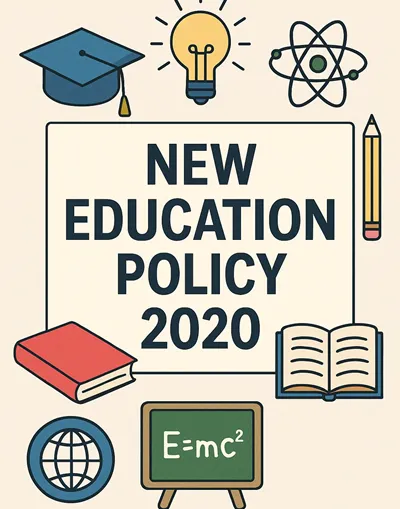
The new National Education Policy (NEP) 2020 introduces novel changes and improvements in the Indian education system. This comes after a span of 34 years of nothing but improvements in education, making learning much better, fun, and more lean toward the future.
School Education:
- A new form: 5+3+3+4 (rather than 10+2)
- Starts learning at age 3.
- Reading, writing, and numbers shall be completed by Class 3.
- There will be teaching in the mother tongue or local language till Class 5.
- Less pressure on board exams, more skills in addition to getting trained for jobs starting from Class 6.
College/University:
- You can leave a course and still get a certificate or diploma:
- 1 well-designed year = certificate
- 2 well-designed years = diploma
- 3 or 4 equivalent years = the whole degree
- Subjects can be combined – you can pair science with music or math with art.
- More focus on thinking, creativity, and problem solving.
- New system to track and save your marks online.
Teachers:
- Better-trained teachers
- By 2030, all teachers must obtain a 4-year B.Ed. degree.
Technology and Online Learning:
- Using digital tools in classrooms
- Create a council to deal with things that are learning technologies.
Other Points:
- Support for all children, including those born to the poorest and disabled.
- Teach all about Indian Culture and Languages.
- Emphasis would be on making learning applicable in the real world.
FAQs on the National Education Policy (NEP) 2020
-
1. Define NEP 2020.
-
This is the reshaping of education in India in the form of a national policy on education that aims to diversify the whole educational process from school to colleges and focuses more on flexible and skill-based learning.
-
2. When was NEP 2020 launched?
-
On 29 July 2020, NEP 2020 was approved by the Government.
-
3. What is the new school system?
-
The new 10+2 education system is replaced with a 5+3+3+4 system:
- 5 years – Foundational
- 3 years – Preparatory
- 3 years – Middle
- 4 years – Secondary
-
4. Starting from what age will children be able to attend school, as per NEP?
-
Formal education starts from the age of 3 years; it also includes preschool years.
-
5. Are students going to learn in their mother tongue?
-
Yes, up to Class 5 and possibly to Class 8, the teaching will be in the mother tongue or local language.
-
6. How will board examinations be transformed?
-
Board exams will become simpler, less stressful, and hence understanding-orientated rather than rote learning-orientated.
-
7. What is the focus in school education?
-
Foundational skills, such as reading, writing, and numbers, along with creativity, critical thinking, and life skills.
-
8. Will students learn job skills?
-
Yes, students will have vocational training and internships starting in Class 6.
-
9. What changes are there in college degrees?
-
Students can exit and re-enter courses:
- 1 year = Certificate
- 2 years = Diploma
- 3/4 years = Degree
-
10. Can a student mix subjects in college?
-
Yes, students may select courses across streams, such as taking science and music or commerce and history.
-
11. What is Academic Bank of Credit (ABC)?
-
This is a digital system that keeps and allows transfer of your academic credits (marks/grades) across institutions.
-
12. How will teacher training take place?
-
By 2030, all undergraduate teachers must have a 4-year B.Ed. degree. Making teacher training better will also be in the works.
-
13. Is there any change in report cards?
-
Yes, report cards will now include self-assessment, peer assessment, and teacher assessment in their overall growth.
-
14. How will NEP leverage technology?
-
There will be more use of digital tools, virtual learning, and smart learning. A new body called NETF (National Educational Technology Forum) will be created.
-
15. Can NEP support all types of learners?
-
Yes, NEP intends to bring into its fold such children with disabilities, girls, and economically weaker sections, ensuring equality in education for all.
Add new comment